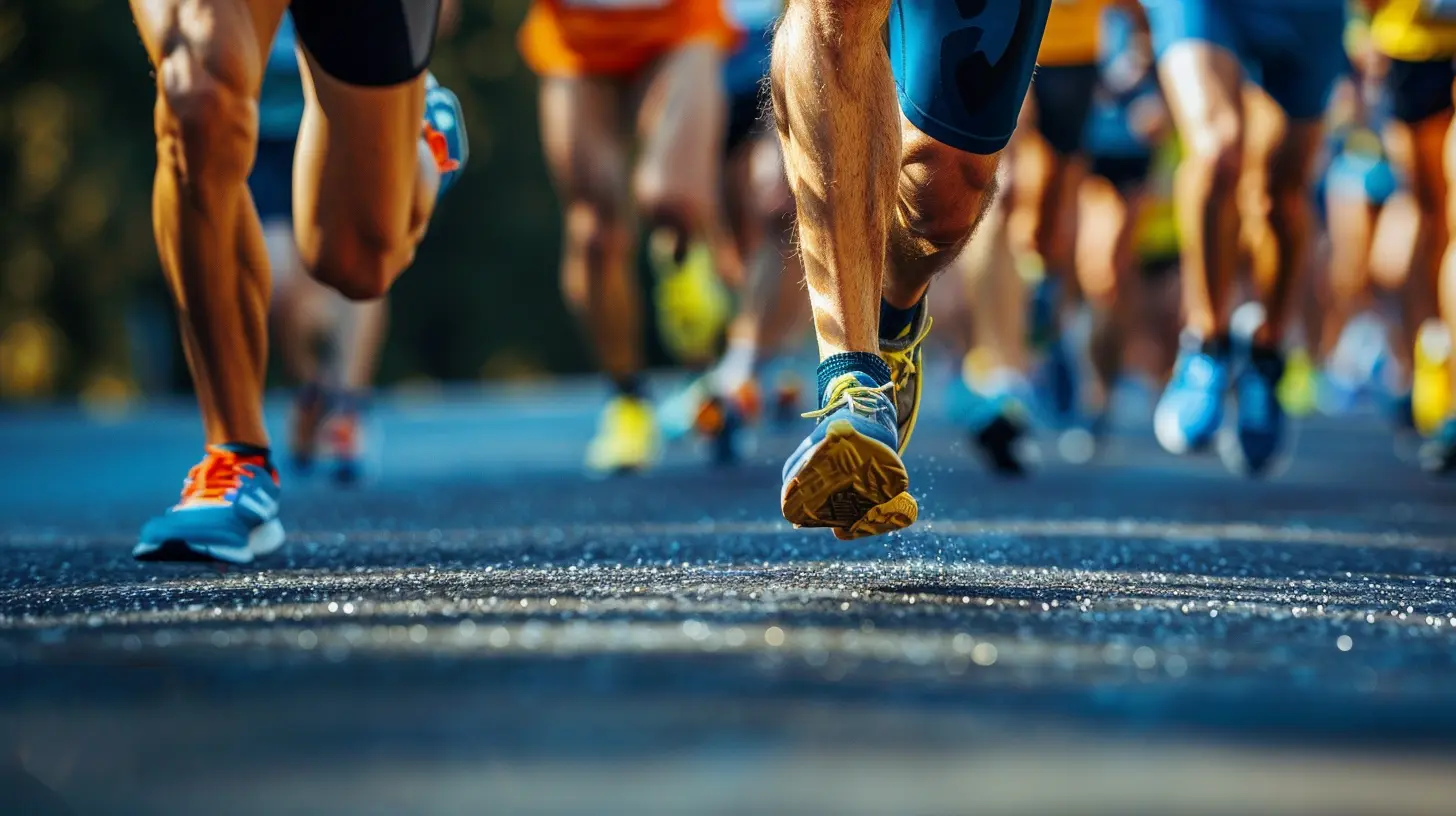Fueling for Success: The Best Nutrition Tips for Marathoners
12 May 2025
Running a marathon is no small feat. It requires not just physical training but also a solid nutrition plan to keep your body energized, strong, and resilient. The right food choices can mean the difference between hitting the wall and crossing the finish line with a smile.
So, whether you're a seasoned marathoner or gearing up for your first 26.2 miles, let's dive into the best nutrition strategies to fuel your success.

Why Nutrition Matters for Marathon Training
Think of your body like a high-performance car. Without the right fuel, it won’t run smoothly—or worse, it might just break down mid-race. Marathon training puts massive demands on your body, draining your energy stores, breaking down muscles, and testing your endurance.That’s where proper nutrition comes in. The right balance of carbohydrates, proteins, fats, and hydration not only keeps you going strong but also helps with recovery, prevents injuries, and boosts overall performance.

Carbohydrates: The Marathoner’s Best Friend
If you’ve spent any time around runners, you’ve probably heard about carb-loading. But why are carbs so important?Carbohydrates are your body’s primary fuel source during long-distance running. They get stored as glycogen in your muscles and liver, providing the energy needed to power through those miles.
How to Incorporate Carbs into Your Diet
- Daily Training Fuel: Aim for 55-65% of your total daily calories from carbs. Whole grains, fruits, vegetables, and legumes are great sources.- Pre-Run Meals: For long runs, eat a high-carb, low-fiber meal about 2-3 hours before heading out (think oatmeal with banana or toast with peanut butter).
- During the Race: After about 60 minutes of running, your glycogen stores start depleting. That’s why endurance runners rely on energy gels, chews, or sports drinks to keep going. Aim for 30-60 grams of carbs per hour during the marathon.
- Post-Run Recovery: Refuel with a good mix of carbs and protein within 30-60 minutes after your run to kickstart muscle recovery.

Protein: Repair and Rebuild
While carbs fuel your run, protein helps repair the wear and tear on your muscles. Marathon training causes small muscle breakdowns, and protein is essential for repairing them stronger than before.How Much Protein Do You Need?
Long-distance runners should aim for 1.2-1.7 grams of protein per kilogram of body weight daily. That means if you weigh 70 kg (154 lbs), you’d need around 84-119 grams of protein per day.Best Protein Sources for Runners
- Lean meats (chicken, turkey, beef)- Fish (salmon, tuna)
- Eggs
- Dairy (Greek yogurt, cottage cheese)
- Plant-based options (lentils, chickpeas, tofu, quinoa)
- Protein shakes (for quick recovery)
Try to include a protein source in every meal and snack to support muscle repair and recovery.

Fats: The Endurance Booster
For years, fats got a bad rap, but they play an essential role in marathon nutrition. Healthy fats provide long-lasting energy, support joint health, and help with vitamin absorption.Best Fats for Runners
- Avocados – Packed with heart-healthy monounsaturated fats.- Nuts & Seeds – Almonds, walnuts, chia seeds, and flaxseeds are great for energy and recovery.
- Olive Oil – A great source of anti-inflammatory fats.
- Fatty Fish – Rich in omega-3s, which help reduce inflammation.
While fats don’t provide quick energy like carbs, they are valuable for endurance athletes during long training runs and races.
Hydration: The Key to Stamina
Dehydration is a marathoner’s worst enemy. Even a 2% drop in body weight from fluid loss can drastically impact performance and increase fatigue.Hydration Tips for Marathoners
- Daily Water Intake: Aim for 3-4 liters per day, depending on body weight and training intensity.- Pre-Run Hydration: Drink 16-20 ounces of water 2-3 hours before your run.
- During the Run: Sip 4-8 ounces of water or a sports drink every 15-20 minutes during long runs.
- Electrolyte Balance: When sweating heavily, replenish lost sodium, potassium, and magnesium with electrolyte drinks or salt tablets.
Pay close attention to your urine color—light yellow means you’re well-hydrated, while dark yellow signals dehydration.
Pre-Race Nutrition: The Art of Carb-Loading
Carb-loading isn’t about stuffing your face with pasta the night before race day. It’s a gradual process that starts 2-3 days before the marathon, ensuring your glycogen stores are fully stocked.How to Carb-Load Properly
- Increase your carb intake to about 70% of daily calories for 2-3 days before race day.- Stick to low-fiber, easy-to-digest carbs like white rice, white pasta, and potatoes to avoid digestive issues.
- Scale back on fatty and high-protein foods since they take longer to digest.
- Stay hydrated while carb-loading to help store glycogen efficiently.
Race Day Nutrition Strategy
Pre-Race Meal (2-3 Hours Before)
- Oatmeal with honey and banana- Bagel with peanut butter
- Toast with jam and a sports drink
Mid-Race Fueling
- Energy gels or chews every 45-60 minutes- Sip on electrolyte-rich drinks
- Avoid trying new foods on race day—stick to what worked in training
Post-Race Recovery: Refuel & Rebuild
Once you cross that finish line, your body is depleted and in repair mode. Your goal is to refuel and hydrate as soon as possible.Post-Marathon Recovery Meal Recommendations
- Carbs: Replenish glycogen stores with fruits, rice, or whole grains.- Protein: Rebuild muscles with lean meats, eggs, or a protein shake.
- Hydration: Drink plenty of water and consider chocolate milk or a sports drink for a mix of electrolytes, carbs, and protein.
Common Nutrition Mistakes to Avoid
Even experienced runners make nutrition mistakes that can wreck their marathon performance. Here’s what to watch out for:1. Skipping Breakfast Before Long Runs
Running on empty can lead to early fatigue and poor performance. Always eat a balanced meal before long training runs.2. Ignoring Mid-Run Nutrition
Waiting too long to fuel during a race can result in hitting the wall—that dreaded, energy-draining crash.3. Overhydrating or Underhydrating
Drinking too much or too little water can lead to dehydration or hyponatremia (low sodium levels), both of which can be dangerous.4. Not Practicing Race Day Nutrition
Race day is not the time to experiment with new foods, gels, or drinks. Test your nutrition strategy during training to avoid stomach issues later.
Final Thoughts
Marathon training isn’t just about the miles you put in—it’s about how you fuel your body. The right nutrition plan can enhance performance, speed up recovery, and give you the energy to crush your goals.So, the next time you lace up your running shoes, remember: food is fuel, water is life, and a well-fueled body is unstoppable.
all images in this post were generated using AI tools
Category:
MarathonAuthor:

Uziel Franco
Discussion
rate this article
5 comments
Barbara Bennett
This article beautifully highlights the crucial role nutrition plays in a marathoner’s journey. Your insights are invaluable for both seasoned runners and those just starting out. Thank you for sharing these essential tips for success!
May 18, 2025 at 3:37 AM

Uziel Franco
Thank you for your kind words! I'm glad you found the tips helpful for all runners. Best of luck on your marathon journey!
Naya McAlister
Proper nutrition is crucial for marathoners; it enhances performance and aids recovery post-race.
May 17, 2025 at 7:55 PM

Uziel Franco
Absolutely! Proper nutrition is key to maximizing performance and ensuring effective recovery for marathoners.
Marcus Fisher
Great insights! Nutrition truly plays a vital role in performance. I appreciate the practical tips shared here; they’ll definitely help me in my training!
May 16, 2025 at 8:01 PM

Uziel Franco
Thank you for your kind words! I'm glad you found the tips helpful for your training. Wishing you success in your marathon journey!
Tilly Hodge
This article effectively highlights the critical role of nutrition in marathon training. It emphasizes a balanced approach, integrating carbohydrates, proteins, and hydration for optimal performance.
May 15, 2025 at 8:48 PM

Uziel Franco
Thank you for your feedback! I'm glad you found the article emphasizes the importance of a balanced nutrition strategy for marathon training. Happy running!
Nathaniel Kelly
Nutrition fuels greatness—run strong, achieve more!
May 13, 2025 at 11:52 AM

Uziel Franco
Absolutely! Proper nutrition is the foundation for peak performance. Fuel wisely to unlock your full potential!




